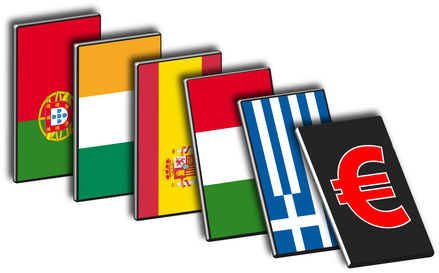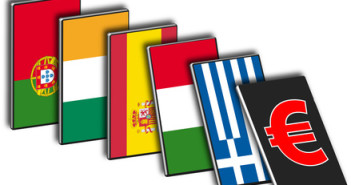Finally, a Greek default is on the cards and has a tentative timing: the first week of November. The G-20 and IMF discussions in Washington have reportedly resulted in enough pressure on Europe to get its act together.
6 countries are in the heart of the crisis at its current situation, together with one institution with a critical role: the ECB. Here are the implications for all of them. And yes, this means a weaker euro, well before the default occurs. Here are expectations for these countries, and the implications for the single currency.
Up to €175 of Greek debt will likely be wiped out – 50% of total Greek debt at the beginning of November. Till then, it’s time to get ready.
- Greece: This painful outcome of an already painful crisis might help Greece. First, some of the harsh austerity measures may be lifted and some growth forward measures could be put in place. Remember the talks about a Marshall plan? It’s time to wipe out the dust out of these plans together with the debt and the failed austerity plans. It might be better for Greece to leave the euro-zone and to rebuild itself with more competitive export and tourism offers, but such a step might not occur soon. If Greece leaves the euro-zone, the political implications will be bad for everyone, but positive for the euro.
- Portugal: The story is somewhat similar to Greece, but Portugal is in a better shape. Leaving the euro is not on the cards, at least now. Pro-growth measures can wipe out demands for a default, and this country will likely stay on the fringes of this crisis, similar to its location on the fringes of Europe.
- Ireland: Contrary to Greece, this country’s government was doing OK and had to swallow the bailout due to the huge pile debt of the banking system. It has every right to demand a default as well, or at least decouple from the banks. Pressure from Dublin to follow Greece’s path will weaken the euro.
- Spain: Similar to Ireland, Spain has a banking problem and no huge problems with the central government, but huge and sometimes hidden debt with autonomous regions and municipalities. The fourth largest economy in the euro area will need more help from the ECB in stabilizing the bond yields and will need to execute successful auctions to restore confidence. The very successful tourism industry will likely help Spain stay on the sidelines of Italy. So far, the upcoming elections on November 20th have not resulted in paralysis but rather with a lot cooperation from the two biggest parites.
- Italy: This is where the ECB might need to break its rules and dive into American style QE. Stabilizing Italy’s huge debt that needs servicing quite soon will require an accelerated pace of bond buying. Up to now, the ECB has bought amounts it could sterilize and was hoping to transfer the portfolio to the bailout fund – the EFSF. The EFSF is unlikely to have these powers (agreed on July 21st) on time. So, only the ECB can act and it needs to scale up and become less conventional. Unsterilized bond buying (not draining money out) means quantitative easing or euro-printing if you wish. This will significantly weaken the euro, but the ECB has no choice. Italy is a big elephant.
- France: On the creditors’ side, the French banks are the most exposed ones to Greek and other peripheral debt. Banks are highly leveraged and recapitalization is clearly necessary in order to absorb the shock. The government in Paris is likely to inject money or even nationalize the big banks, and will likely lose its perfect AAA rating. The euro-zone’s second largest economy has already stalled and this may throw it deep into recession.
Jean-Claude Trichet’s last project
The ECB has a huge role in handling the Greek default and making it as orderly as possible. This comes at a time when the current president, Jean-Claude Trichet, is set to step down on November 1st, when this event can happen. In his last days at the ECB, Trichet will need to get out of his stubborn “single needle in the compass” thinking at act fast. He can still go down in history as a hero and can start with cutting the rates to promote growth.
The big “known unknown” is Credit Default Swaps (CDS), as in 2008. This is a factor that can exacerbate the situation and make the most intelligent and heroic efforts useless. When CDS events will be triggered, we’ll hear again that there’s no such thing as an orderly Greek default.
What will happen to the euro?
I believe that the single currency will survive. Contrary to the current popular bashing about the existence of the currency, it has huge advantages, especially for Germany. It is just overvalued, and this is about to change.
A move towards 1.30 and to 2011’s lows of 1.2873 will likely start soon. EUR/USD was launched in 1999 at 1.17. This might be a long term target for the second phase of the single currency.
For the upcoming week’s events and technical levels, see the euro.
